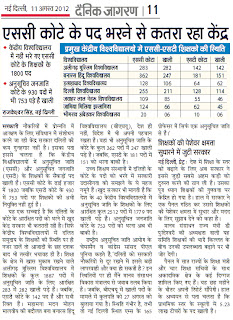Quotas fail to break caste ceiling in IITs
Akshaya Mukul, TNN | Sep 12, 2012, 03.43AM ISTWhile many IITs replied to RTI activist Mahendra Pratap Singh, IIT-Delhi and Bombay are yet to give their response. Another query to the Prime Minister's Office about social profile of scientists in the laboratories of Central Scientific & Industrial Research has not evinced any reply.
IIT-Kharagpur, among the oldest, has only three SC professors, two associate professors and two assistant professors. There are no ST faculty members at all three levels. There are two OBC professors and seven assistant professors, but no associate professor. However, in the general category, there are 227 professors, 105 associate and 165 assistant professors.
IIT-Madras, among the best in its ilk, has three SC professors, three associate professors and four assistant professors. Again, STs are unrepresented in two categories. A lone ST is assistant professor. Even OBCs are not there at the level of professor and associate professor, but there are seven assistant professors.
Considering that Tamil Nadu has been the hotbed of social movement, under-representation of marginal castes and STs is intriguing. From the general category there are 212 professors, 91 associate professors and 177 assistant professors.
Moving to the north to IIT-Roorkee, and the situation still does not change. Among the best in the world as a civil engineering institute, Roorkee has only one SC professor and associate professor. There are six SC and one ST assistant professor. OBCs are better placed in Roorkee with 11 professors, 11 associate professors and seven assistant professors. Among general category, there are 120 professors, 57 associate professors and 133 assistant professors.
With representation so skewed in well-established IITs, new ones can hardly be blamed for not getting enough eligible SC/ST teachers. IIT-Ropar has absolutely no representation from SCs/STs at any position. There are two OBC assistant professors. IIT-Hyderabad has 12 SC, six ST and 22 OBC assistant professors. In IIT-Gandhinagar, there are only two OBC assistant professors, while SCs/STs have no representation at the three levels.







